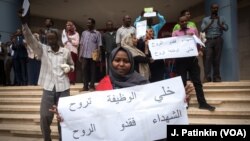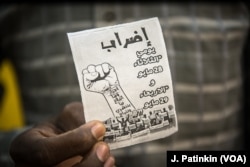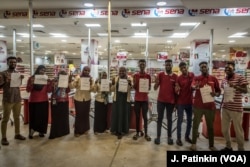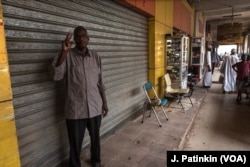Chanting anti-government slogans, workers lined up outside the upscale al-Waha shopping center in downtown Khartoum, demanding an end to the country's 30-year military rule.
"Our martyrs lost their lives," they shouted, referring to the dozens of people killed since December in Sudan's revolution. "We can lose our jobs."
Tuesday was the first day of a two-day nationwide strike called by opposition leaders demanding that Sudan's military junta transfer power to a civilian government. The junta took power in April following the ouster of longtime president Omar al-Bashir after months of street protests.
Bashir had ruled for nearly 30 years and was accused of human rights abuses and corruption.
An alliance of unions, professional organizations, and political parties called the strike. Talks between the alliance and the military council, which took power in an April coup, collapsed earlier this month after soldiers attacked peaceful demonstrators in the city, killing several and wounding hundreds.
The talks had stalled over whether civilians or generals would have control of a sovereign council meant to run the country for the next three years before elections.
With talks deadlocked, leaders of Sudan's protest movement said they are escalating their pressure on the military, starting with the strike.
Outside al-Waha mall, Idris Ibrahim, a teller at the Bank of Khartoum, said the Sudanese people are growing impatient.
"We want a civilian government," he said. "The military council has had the country for almost 50 days now. We've had negotiations, but they don't seem to want to give us our civilian government."
Around the nation, workers in various sectors posted photos of themselves on social media holding signs supporting the strike, including oil workers, dentists, sugar processing employees, cement factory workers, and veterinarians.
Numerous international flights to Sudan were also cancelled as aviation employees threatened to strike.
The broad support for the protest was despite the rejection of the strike by of the opposition Umma Party, a member of the opposition alliance, which had raised fears of a split in the civilian movement.
Back at al-Waha mall, Ibrahim said the upper management of his bank was totally against the strike. A few steps away, his colleague Susana Abdalla Hassan said her bosses' stance didn't matter to her.
"I don't care," she said. "Even if they fire me, it's a small tax for the country. There are people who have lost their lives. The job is nothing."
Inside the mall, many shops remained open, but employees supported the strike by refusing to do any work.
At a shop of the MTN mobile phone company, staff politely turned away any potential customers away at the door, handing small pieces of paper explaining their support for the strike.
At the Sena supermarket, employees lined shopping carts to block shoppers from entering.
Throughout Khartoum, most businesses appeared shuttered, except for small stores selling basic necessities and petrol stations.
On one run-down block, Siddig Ibrahim said he managed one of eight stores that normally sell clothes, watches, shoes, and other goods. All of them agreed to close.
"We ask everybody who is not striking to join the strike. It's for the nation," he said. "Those who aren't striking don't represent the majority."
On Ibrahim's block, only one shop - selling ties, suits, and dress shirts - remained open. The owner said he opened his store because he had not heard of the strike, but added he would close up soon because he feared crowds of striking workers that had gathered in the streets.
There were no reports of violence from protesters by late Tuesday, but members of the military council earlier vowed to fire any striking government workers.
Video circulated on social media Tuesday appeared to show uniformed security forces arresting staff of an electricity utility. Sudanese electricians had otherwise downed their tools, but said they would ensure power supply to necessary services such as hospitals.
The Sudan Professionals Association, a leading member of the opposition alliance, also accused members of the military of entering the Central Bank and attempting to force employees to work.
SPA spokesman Amjed Fareed condemned the alleged arrests, which he described as "illegitimate" and a "clear violation of political freedom of association."
"The military council have to see the will of the Sudanese people, and accept it, and implement its previous commitment of handing over the power to a civilian government," he said.
Fareed added if the military does not hand power to civilians after the strike ends Wednesday, the opposition alliance will call for further civil disobedience.








